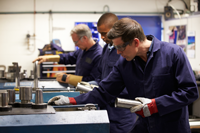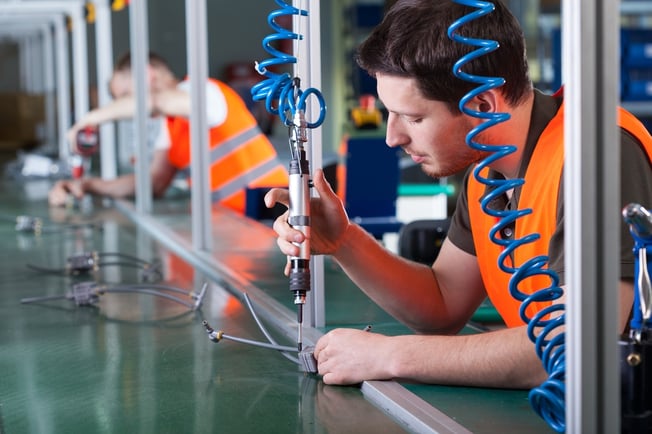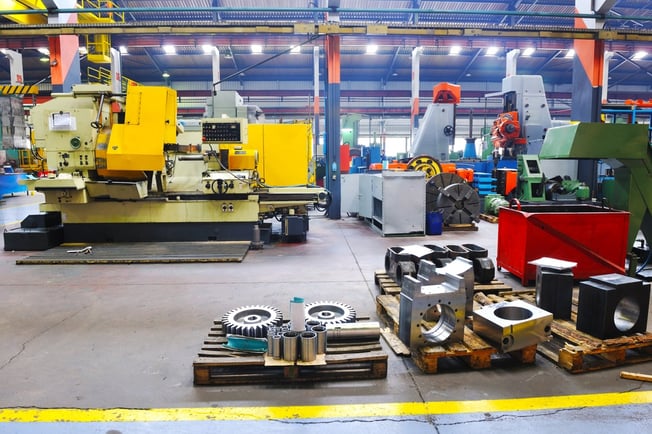

The future success and growth of U.S. manufacturing lies in “advanced manufacturing” – a phrase gaining popularity in industrial manufacturing circles and within the economic development, site selection and industrial commercial real estate spaces.
While there are multiple definitions of the term “advanced manufacturing” among industry sources, its general meaning is the use of “advanced,” “innovative,” or “cutting edge” technology to improve products and/or processes. Most commonly, advanced manufacturing technology encompasses many of the manufacturing developments of the late 20th and early 21st centuries, including high tech products and processes and lean, green, and flexible manufacturing techniques.
The technologies used in advanced manufacturing methods typically include:
- Computer technologies (e.g., CAD, CAE, CAM)
- High Performance Computing for modeling, simulation and analysis
- High Precision technologies
- Advanced robotics and other intelligent production systems
- Control systems to monitor processes
- Sustainable and green processes and technologies
- New industrial platform technologies
- Ability to custom manufacture
- Ability to manufacture high or low volume (scalability)

In 2016, the manufacturing sector accounted for 11.7 percent of U.S. Gross Domestic Product and employed 12.3 million workers (9 percent of total employment). Over the past 25 years, U.S.-manufactured goods exports have quadrupled. It is an essential core of America’s innovation economy. Yet, as the U.S. Department of Energy’s Advanced Manufacturing Office states: “For advanced manufacturing to have a greater positive impact on the U.S. economy, it will need the active participation of communities, educators, workers, and business, especially small and medium-sized enterprises, as well as federal, state, and local governments.”
Indeed, there are significant challenges for companies considering advanced manufacturing. To be successful, along with appropriate industrial commercial real estate, advanced manufacturing requires a skilled workforce, abundant raw materials and suppliers, available shipping channels and logistics, utilities and power, and a supportive business environment to ensure growth.
Find out about adaptive reuse for industrial properties here.
Hampton Roads is a growing region ripe with affordable commercial sites and facilities. With long-established state and regional business incentives, the region offers a lower-risk environment for emerging businesses. The region also features:
Comprehensive transportation infrastructure
Access to Norfolk International Airport and regional airports; proximity to the Port of Virginia and the Coastal Waterway; major train lines spanning the eastern U.S.; and primary delivery and commuter routes via interstates Interstate 64 and Interstate 95.
Low Tax Rates
Corporate rates in Virginia and North Carolina are competitive nationwide and pro-business.
Utilities and Power
Look for an infrastructure that includes everything an advanced manufacturing business needs: electricity, natural gas, high speed internet, county water and sewer systems.
Skilled Workforce
The regional laborshed is over 1 million strong.Thousands graduate each year from the region’s 10 colleges, universities, and technical schools, and combine with veterans from several nearby military bases to provide a constant pipeline of new, qualified workers into the area.

As part of the Hampton Roads region, new businesses in Currituck County also benefit from North Carolina’s decidedly business-friendly infrastructure.
For 50 years, North Carolina State University’s Industrial Extension Service has provided a comprehensive portfolio of services and expertise to local businesses, including health and safety, sustainability and energy, operations, evaluation and assessment, customized employee and leadership training and more. Specific to manufacturing, IES provides executive peer councils, Lean Improvement Councils, and mfgNC Connections - all providing opportunities to share resources, innovations, and learn from best practices.
Northeastern North Carolina is already home to a large and diverse base of advanced manufacturing companies, including aviation, boatbuilding, plastics and rubber, chemical, sensor, steel and aluminum, and metal fabrication and manufacturing that create products used worldwide. This growing sector of businesses is choosing Currituck County to benefit from our low cost of doing business, educational resources, workforce development programs, and pro-business climate.
This article was originally published by Inside Business.
###
Thinking of moving your business to North Carolina to take advantage of these and more benefits? Our free guide will help you decide if making the move is right for you.
These Stories on Commercial Real Estate
No Comments Yet
Let us know what you think